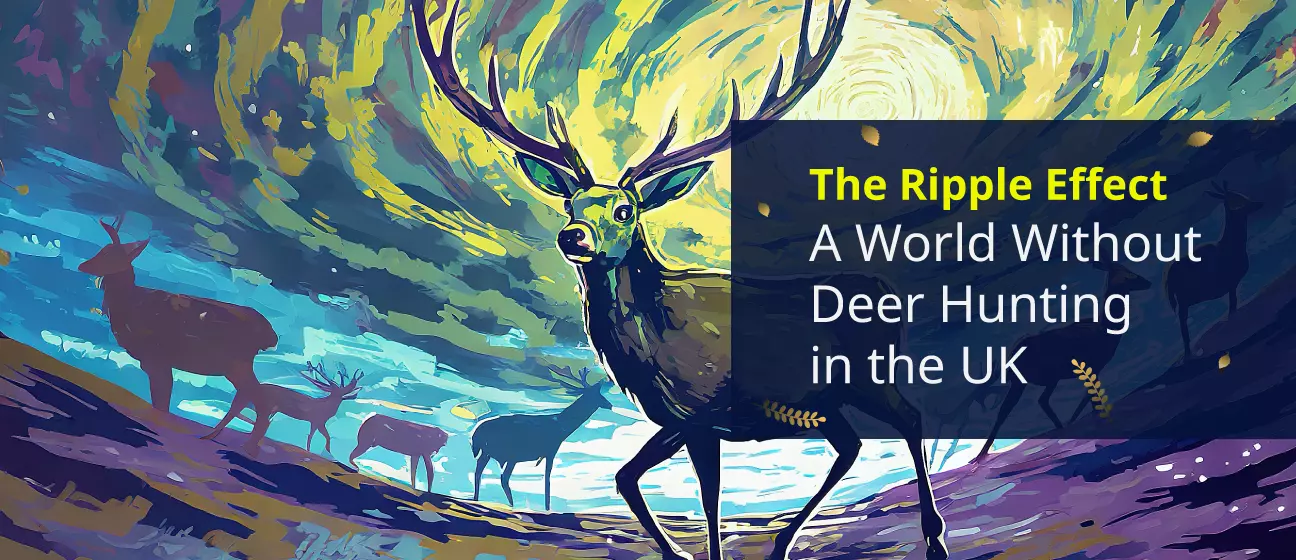The ripple effect: A world without deer hunting in the UK
14-Jul-2024

Mark Eves
Deer are an iconic and vital part of the United Kingdom's wildlife. Their populations have been steadily growing over the years, with approximately 2 million wild deer currently inhabiting the UK. What would happen if we were to ban deer hunting, and fast forward 50 years into the future? In this blog, we will explore the potential consequences of such a scenario by considering scientific evidence and facts.
Current deer population and growth rate
As of now, the UK boasts a deer population of around 2 million. The population growth rate is estimated at 30% annually. This substantial growth can have cascading effects on the environment and other species.
What happens in a world without deer hunting?
Deer overpopulation: With hunting banned, deer populations would explode. After 50 years of unrestricted growth at a 30% rate, the deer population could theoretically reach an astonishing 65 million.
Habitat destruction: An unchecked deer population would exert enormous pressure on the environment. Overgrazing and habitat destruction would become severe issues. Woodlands, shrublands, and grasslands would suffer, impacting various plant species and the creatures that depend on them.
Crop damage: Farmers would bear the brunt of this population surge. Crop damage by deer would escalate, leading to significant agricultural losses and potential food security concerns.
Vehicle collisions: An increase in deer populations would also lead to more frequent and dangerous vehicle collisions. This poses risks to human safety and property.
Disease transmission: Overcrowded deer populations can facilitate the spread of diseases like bovine tuberculosis (TB) and Lyme disease, affecting livestock, pets, and humans.
Predator-prey dynamics: With a surplus of deer, the pressure on natural predators such as foxes, wolves (if reintroduced), and large birds of prey could increase. This might lead to imbalances in predator-prey dynamics.
Impact on flora and fauna: Overgrazing by deer can negatively affect native plant species. Reduced plant diversity can, in turn, harm insect populations and the animals that rely on them for food.
The domino effect on other species
The repercussions of banning deer hunting would ripple through the ecosystem:
Birds: Some bird species that depend on woodlands and shrublands could face habitat loss due to overgrazing.
Insects: Reduced plant diversity can affect insects, impacting the diets of birds and other insectivorous creatures.
Small mammals: Competition for resources and increased predation by unchecked deer could lead to declines in small mammal populations.
Predators: Increased deer numbers may benefit predators in the short term but could lead to eventual food shortages and conflicts as deer populations outstrip available prey.
Final thoughts
A world without deer hunting in the UK would have profound and far-reaching consequences. With deer populations growing unchecked, the environment would suffer, agricultural interests would be threatened, and the delicate balance of ecosystems would be disrupted. It's essential to consider not just the preservation of deer but the overall health and stability of the ecosystem when discussing wildlife management and conservation. Effective and sustainable deer management strategies should be designed to mitigate these potential future challenges while respecting the importance of deer in the UK's natural heritage.
Must read:
